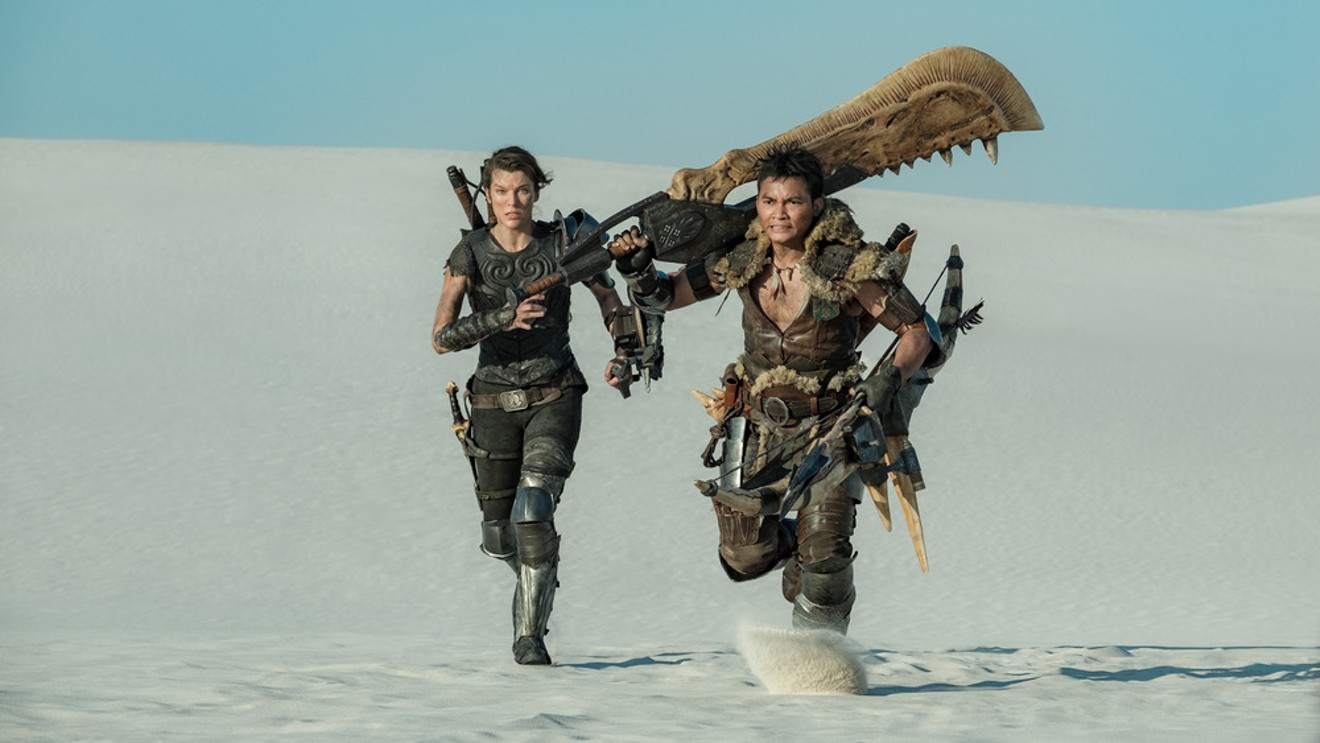There is no greater pleasure in this world than watching Paul W.S. Anderson and Milla Jovovich team up to deliver a spectacle of action. You could even say the duo are the best coupled director and actor to offer consistently great results in American cinema since John Cassavetes and Gena Rowlands. The days of Resident Evil films (Anderson directed the first, fourth, fifth, and sixth installments starring Jovovich) are now long gone but certainly not forgotten, as the pair treads into new territory by adapting a new video game franchise: Monster Hunter.
Much like the Resident Evil films, Anderson’s work is less interested in mimicking any one game from the Monster Hunter franchise. Instead, it uses the name to create his own installment that takes place primarily within the “New World.” Army ranger Artemis (Milla Jovovich) and her compatriots find themselves in this monster-populated new world after an odd desert storm opens up a portal, poorly attempting to survive against a threat none of them has ever faced with a little help from a nameless hunter (Tony Jaa).
Jovovich’s Artemis in Monster Hunter is sort of a unique extension of her work as Alice in Resident Evil. Though where Alice’s story progressed into more sincere and dramatic territory, Artemis’ leans into the same kind of levity and a sense of humor that the duo toyed with in Three Musketeers. In fact, a solid half of the film plays out more like a buddy action-comedy between Jovovich and Jaa’s characters, who brawl with each other (due to cultural and language barriers) just as much as the creatures they team up to take down.
It’s hard not to look at Monster Hunter and not see how Anderson’s entire career seems designed to lead up to this point. The bare-bones rescue team plot and simple characterization that leads to dimensional uncertainty and new threats are nearly beat for beat from Event Horizon. His disdain for the military-industrial complex once again appears subtly here: The uselessness of military weapons, the quick disposal of expendable soldiers, and a constant presence of a satirical song about life in the army (“Gee, Mom, I Want to Go Home”). Even something as simple as an extensive set piece in a Nerscylla cavern (that’s what the games call giant spiders) is in conversation with his work as a horror filmmaker — especially that of his minor (but damn good) Alien universe entry, Alien vs. Predator.
In every way, Monster Hunter feels designed by someone who loves the games. Anderson adapts enough to create a giant sandbox in which the director gets to play around however he pleases, complete with creating goofy cutscenes and having delightful character cameos. One can’t help but consider Ray Harryhausen’s delightful adventures, particularly something like Clash of the Titans, while experiencing the great work being showcased here. The special effects that are sometimes at odds with his live-action are no more. The desert landscape, giant creatures, and insignificant humans all come together naturally.
There is no lazy obscuring of monstrosity like modern American Godzilla movies like the miserable King of the Monsters does, instead shamelessly indulging in close-ups and wide shots of what precious few monsters from the games they chose to highlight (the Diablos of which may be the most gorgeously rendered on screen). Some may complain that the film’s cutting of these action sequences is “choppy,” but Anderson’s second collaboration with editor Doobie White (the first being Resident Evil: The Final Chapter) shows how essential he is in bringing out the best in the filmmaker’s images.
Disorientation runs through a lot of Monster Hunter, but it’s a feature more than a flaw. Anderson whips the camera around any which way he pleases at times, playing with character and creature perspective often to great effect, and introducing all kinds of unique angles for anything from conversations to training montages. Some of his low angle and aerial shots during his one-on-one matches (between friends and foes alike), paired with Paul Haslinger’s booming synth score, are practically designed like WWE matches — at one point even allowing a small cast of extras to cheer on their champions before a big fight.
Anderson’s Monster Hunter may not change the minds of skeptics who aren’t fond of his work and dismiss them as bad B-movies based on an art form they don’t really respect. But as the lines continue to blur between what “cinematic gameplay” is and what “films that look like video games” are and many directors claim to be “elevating” the genres they work within, Anderson’s adaptations (from Mortal Kombat to now) are as close to a true hybrid of the forms as we’re ever going to get.
Monster Hunter. Starring Milla Jovovich, Tony Jaa, Ron Perlman, Tip ‘T.I.’ Harris, Meagan Good, Diego Boneta, Josh Helman, and Jin Au-Yeung. Directed and written by Paul W.S. Anderson. Rated PG-13. 103 minutes. Opens in theaters Friday, December 18.
[
{
"name": "Air - MediumRectangle - Inline Content - Mobile Display Size",
"component": "19274298",
"insertPoint": "2",
"requiredCountToDisplay": "2"
},{
"name": "Editor Picks",
"component": "17482312",
"insertPoint": "4",
"requiredCountToDisplay": "1"
},{
"name": "Inline Links",
"component": "18711090",
"insertPoint": "8th",
"startingPoint": 8,
"requiredCountToDisplay": "7",
"maxInsertions": 25
},{
"name": "Air - MediumRectangle - Combo - Inline Content",
"component": "17482310",
"insertPoint": "8th",
"startingPoint": 8,
"requiredCountToDisplay": "7",
"maxInsertions": 25
},{
"name": "Inline Links",
"component": "18711090",
"insertPoint": "8th",
"startingPoint": 12,
"requiredCountToDisplay": "11",
"maxInsertions": 25
},{
"name": "Air - Leaderboard Tower - Combo - Inline Content",
"component": "17482313",
"insertPoint": "8th",
"startingPoint": 12,
"requiredCountToDisplay": "11",
"maxInsertions": 25
}
]












